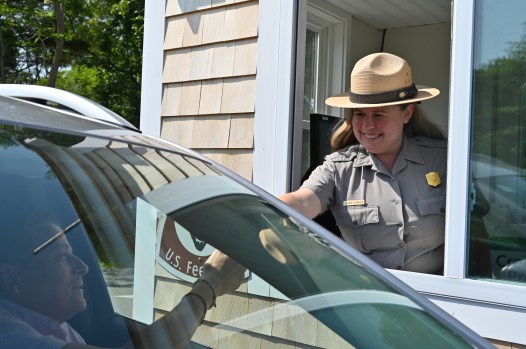Local sports and entertainment venues are not the only ones bidding farewell to revenue.
Make sure your debit and credit cards are ready for use this summer on the Cape.
On July 1, Cape Cod National Seashore will switch to a completely cashless system at its fee entrance stations. The only payment methods accepted at beach entrance booths are credit cards, debit cards, or mobile phones.
Shark scientists are warning Cape beachgoers to be Shark Smart as summer approaches because white sharks hunt seals along the coast.
According to the National Seashore, switching to electronic payments shortens transaction times and makes them safer.
The ruling is in line with U.S. Treasury rules and a recent executive order to decrease the volume of checks and cash processed by the federal government.
According to a statement from Park Superintendent Jennifer Flynn, 10% of in-person park transactions are cash. Park rangers can spend up to eight and a half hours a day recording, reporting, and transferring monetary earnings during the hectic summer months.
By implementing a cashless system, park employees will spend less time handling cash, be more available to interact with visitors and collect fees, and have more money available to fund important initiatives and visitor services, Flynn continued.
According to the National Seashore, entrance fees are a vital source of funding for enhancing the experience of tourists in national parks.
These funds are utilized by Cape Cod National Seashore for initiatives such as repairing the boardwalk and observation platform at Marconi Beach, erecting new beach fee booths, and repairing the boardwalk along the Beech Forest route.
At hundreds of National Park Service, US Forest Service, Bureau of Land Management, Fish and Wildlife Service, and US Army Corps of Engineers locations across the nation, visitors can use the Recreation.gov online service and the mobile app to pay for entrance fees, advance camping reservations, user fees, and more.
Related Articles
-
Cape Cod shark detections: Where are the top hotspots for white sharks?
-
White shark in Cape Cod Bay chomps on hooked striped bass: Be aware the sharks are around
-
Massive shark washes up on Cape Cod beach: May look like it s smiling but sadly, it is not
-
As great white sharks arrive, swimmer starts 60-mile swim around Martha s Vineyard
-
As white sharks return, Massachusetts researchers urge people to be shark smart
Since white sharks travel north for the summer and fall, more of them come at the Cape during this time of year.
In ten feet of water, fishermen recently witnessed a young white shark pursuing striped bass.
Cape Cod is experiencing shark season! uploaded by the Atlantic White Shark Conservancy.
Remember to be Shark Smart when you go to the beach! “The Conservancy wrote.” Refresh your knowledge of white shark public safety materials by downloading the Sharktivity App.
White sharks love to eat in the inshore waters off numerous Cape Cod and South Shore beaches. In shallow water along the coast, white sharks hunt and consume seals.
Those who recreate in ocean waters run the risk of this. Although they are uncommon, white shark bites on people have happened off Cape Cod. The most recent bite, which occurred in September 2018, was fatal.
Beach management and the temporary closure of beaches for swimming when a shark sighting is confirmed are the responsibilities of local towns in the Cape and Islands as well as the Cape Cod National Seashore.
Together with the Massachusetts Division of Marine Fisheries, the Conservancy collaborates closely with these organizations to provide shark alert signs for beaches, flags, and pamphlets that inform and advise beachgoers.
Following lifeguard instructions, paying attention to beach flag warnings, staying close to shore so rescuers can reach you, avoiding seal-infested regions, avoiding schools of fish, limiting splashing, avoiding murky water, and never being alone are all part of the Conservancy’s Shark Smart safety guidelines. and understand that in shallow water, sharks hunt seals.












